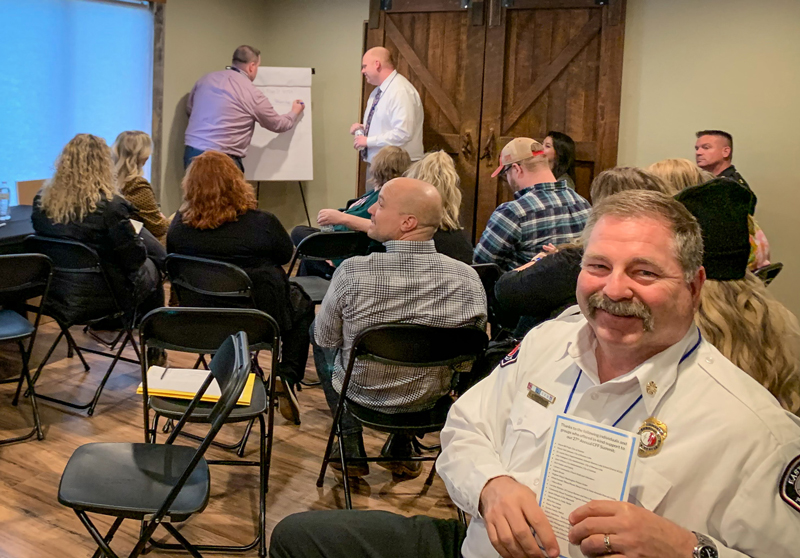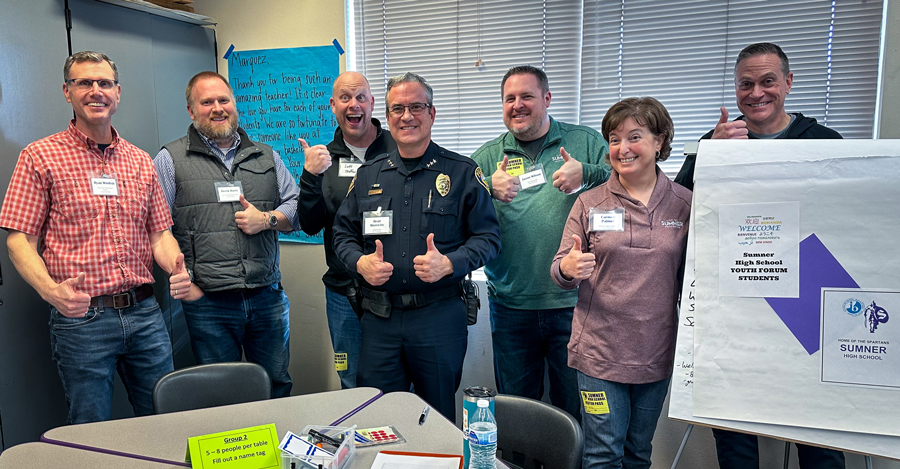by
<a href="mailto:communicationsteam@awcnet.org">Communications</a> | Dec 11, 2023
The City of Sumner models resiliency by adapting its community outreach to better meet the needs of its residents.
The City of Sumner models resiliency by adapting its community outreach to better meet the needs of its residents.
By: Allyson Meyer
When the City of Sumner founded its Sumner University community outreach program more than two decades ago, the goal was to give residents a better understanding of how local government works via a series of classroom sessions and behind-the-scenes tours of city facilities.
“It started as an introductory session for people volunteering to serve on a commission,” explains Carmen Palmer, Sumner’s communications director. “People liked it so much that the city began offering it to the public to join, and it grew from there.”

City of Sumner Fire Chief Bud Backer (foreground) attends the city’s 2020 Community Summit, an outreach exercise to elicit feedback from residents about its evolving Sumner University community engagement program. Credit: Courtesy City of Sumner
Although the program was popular throughout its initial decade, by the mid-2010s, attendance began to decline, prompting administrators to pivot to a different model, offering monthly tours of different facilities. Explains Palmer, “the tours included our wastewater treatment facility, which was very popular, our city public works shops, a driving tour of our history with a stop at the cemetery, etc. Then, we ended with a tour of the police station.”
She notes that they kept one element of the original program: “We asked people to split into groups and tell us what’s working, what could be better, and what could we do together to make it better.”
Ultimately, the time commitment, weather limitations, and waning audience interest proved challenging for the program, which was put on hold at the onset of the COVID-19 pandemic. The program remains on hold as the city evaluates whether to resurrect elements of Sumner University or replace it altogether with a program that better serves the needs of the community.
“Flexibility to respond to people’s expectations is a good thing,” Palmer stresses. “The main goal is to have good community engagement and communication. You have tools in your toolbox and, as circumstances change, you select the ones that work best for your city at that time. It would be terrible for a city to say they won’t engage in social media today because it wasn’t done that way 20 years ago; it would be equally as bad to cling to a program like Sumner University simply because that’s what was done 20 years ago.”
Flexibility to respond to people’s expectations is a good thing,” Palmer stresses. “The main goal is to have good community engagement and communication.
As Sumner’s community engagement process evolves, the city is focused on increasing touchpoints and taking city initiatives directly to residents. One example is Sumner Connects, a web-based portal that provides information and elicits public feedback about city projects—including a vision for the city’s Main Street, as well as flood protection and habitat restoration along the White River.

The City of Sumner’s senior staff breaks between sessions at Sumner High School during a city-led exercise to engage and teach students about local government. Credit: Courtesy City of Sumner
“Engagement means more than reading comments on Facebook,” Palmer says. “It means really understanding the pulse of the community, not just the words from whoever is shouting the loudest. We have to keep extending access to different audiences. I call them the ‘reach audiences’—the ones who don’t attend scheduled public meetings and functions and need the city to reach out to them. That reach needs to be about building relationships, which includes increasing trust and accessibility.
Engagement means more than reading comments on Facebook,” Palmer says. “It means really understanding the pulse of the community, not just the words from whoever is shouting the loudest.
“The tools will change over time, but one thing won’t change: We have to build understanding. Agreement may not be possible, but there’s a big difference between understanding and agreement. We have to listen to the silent majority.”